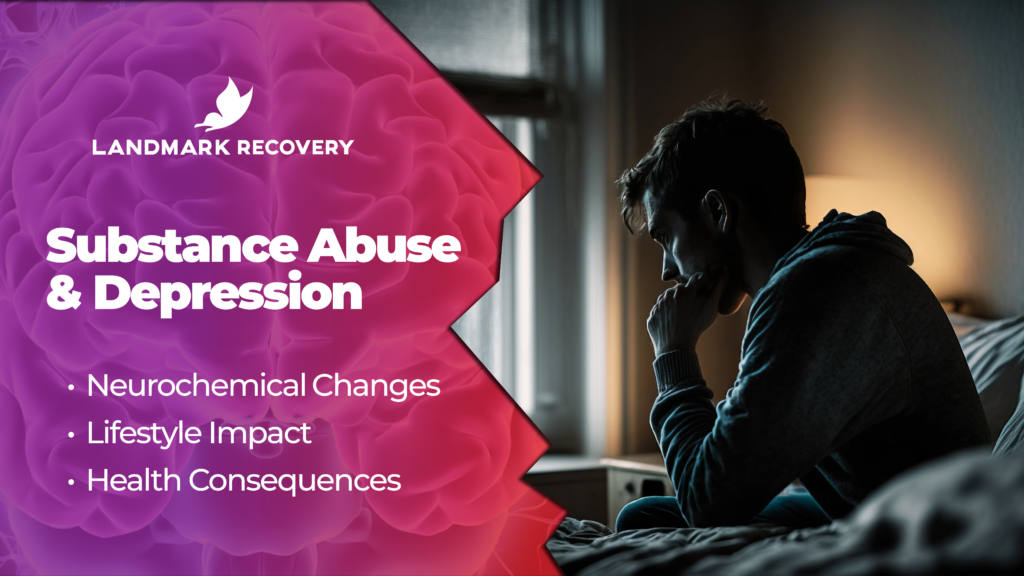Substance abuse and mental health are intricately connected, so much so that understanding the intricate relationship between anxiety, depression, and substance abuse is crucial to addressing either issue effectively. In particular, the connection between depression and substance abuse is a complex and reciprocal one: not only can substance abuse lead to depression, but depression can also lead to substance abuse.
Understanding Depression and Substance Abuse
Depression is a severe mental health disorder characterized by prolonged feelings of sadness, hopelessness, and disinterest. It disrupts daily functioning and significantly reduces the quality of life. Meanwhile, substance abuse, often termed as substance use disorder, is a condition where the use of one or more substances leads to a clinically significant impairment or distress.
The Co-Occurrence of Depression and Substance Abuse
Depression and substance abuse frequently co-occur, meaning they often happen together. This dual diagnosis, sometimes referred to as comorbidity, can complicate treatment efforts because the two conditions can exacerbate each other. This is further complicated by the fact that each condition can have symptoms that mimic the other, making diagnosis and treatment a complex process.
Is Depression a Symptom of Substance Abuse?
In many cases, depression can indeed be a symptom of substance abuse. Substance abuse can lead to depression in multiple ways:
Neurochemical Changes
Substances like alcohol, opioids, and stimulants can alter the brain’s structure and function. They do this by affecting neurotransmitters, the brain chemicals that communicate information throughout our brain and body. This can disrupt the normal balance of these chemicals, leading to symptoms of depression.
Lifestyle Impact
Substance abuse often leads to significant lifestyle changes that can trigger or worsen depression. This includes financial difficulties, relationship problems, job loss, and legal issues. The chronic stress associated with these issues can contribute to depressive symptoms.
Health Consequences
Substance abuse can also lead to severe health problems, which can be both a direct cause of depression and a contributing factor. These health problems can include chronic pain, liver disease, and other physical health problems that can cause depressive symptoms.

Does a Genetic Component Exist for Depression and Addiction?
The interplay between genetics, depression, anxiety, and substance abuse is a complex one. Research suggests that all these conditions have a significant genetic component, meaning that they can run in families. Genes associated with these disorders may influence how individuals respond to stress, making them more susceptible to depression, anxiety, and substance abuse. However, genetics is only part of the story. Environmental factors, such as trauma or chronic stress, can trigger these disorders in genetically susceptible individuals. It’s also worth noting that these conditions often co-occur, with anxiety and depression often serving as triggers for substance use, and vice versa. Therefore, understanding and addressing this interconnected relationship is key to effective prevention and treatment strategies.
The Self-Medication Hypothesis
It’s important to note that while depression can be a symptom of substance abuse, the reverse is also often true. Many individuals suffering from depression may turn to drugs or alcohol as a form of self-medication, hoping to alleviate their mental distress. This is known as the self-medication hypothesis.
Although substances might provide temporary relief, they often exacerbate the symptoms of depression over the long term. This creates a vicious cycle where the individual continues to use substances to relieve worsening depressive symptoms, leading to more severe substance use and more severe depression.
Treating Co-occurring Depression and Substance Abuse
Given the complex relationship between depression and substance abuse, treating them requires a comprehensive, integrated approach that addresses both conditions simultaneously. This is often referred to as dual diagnosis treatment.
Dual diagnosis treatment involves a combination of interventions, including psychotherapy, medication, lifestyle changes, and support groups. Cognitive-Behavioral Therapy (CBT) and Dialectical Behavior Therapy (DBT) are two forms of psychotherapy that have proven particularly effective in treating co-occurring depression and substance use disorders.
A Call for Integrated Treatment Approaches
In conclusion, depression can indeed be a symptom of substance abuse, just as substance abuse can be a symptom of depression. This complex relationship necessitates an integrated approach to treatment that addresses both conditions concurrently. By doing so, we can break the cycle of depression and substance abuse, helping individuals regain control of their lives and achieve long-term recovery.
Download our informational PDF on the relationship between substance abuse and depression.
Learn More
At Landmark Recovery, we understand the complexities of co-occurring disorders, and we are committed to providing comprehensive, evidence-based treatment that addresses the unique needs of each individual. If you or a loved one are dealing with depression and substance abuse, please reach out to us. You are not alone, and help is available. Call our 24/7 hotline at 888-448-0302.

Choose Recovery Over Addiction
We're here 24/7 to help you get the care you need to live life on your terms, without drugs or alcohol. Talk to our recovery specialists today and learn about our integrated treatment programs.




